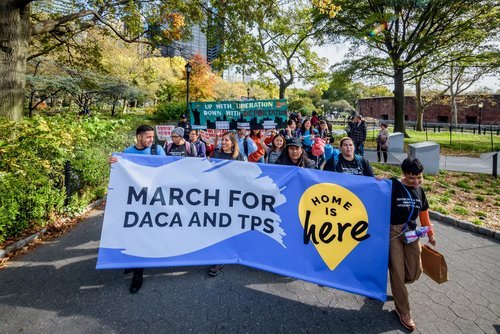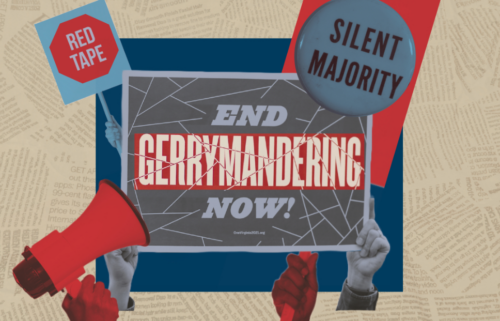They sued Trump. Then they walked 230 miles for their day in court

Eliana Fernández has blisters on her feet and her legs ache. She walked for more than two weeks and trekked 230 miles to get here.
Her destination: the US Supreme Court, where justices heard arguments Tuesday that could decide her fate and shape the lives of hundreds of thousands of people across the United States.
Fernández, 31, is one of the plaintiffs suing the government over the Trump administration’s decision to end Deferred Action for Childhood Arrivals, or DACA. The Obama-era program provides deportation protection and work permits to around 700,000 young undocumented immigrants brought to the United States as children.
The Trump administration has argued the executive action that created the program was an overreach of authority.
So far, a series of lower court orders have blocked the administration’s efforts to terminate DACA, giving those who benefit a reprieve but also leaving their lives in a fragile limbo.
Now, after years of uncertainty and political stalemates, this could be the make-or-break moment for many so-called Dreamers and the program that protects them. If justices uphold the administration’s decision to end the program, those who were shielded by DACA for years could lose their work permits and become vulnerable to deportation.
“I hope they rule on the right side of history,” Fernández told reporters after arguments concluded Tuesday.
There are far easier ways to get from New York to Washington. But Fernández says she walked — and spoke out as much as she could along the way — to make sure Supreme Court justices and members of the public know how much this matters.
She didn’t march alone. About two dozen others walked beside her throughout the demonstration that began in New York City on October 26, and the group’s ranks grew as they neared the nation’s capital.
Their message as they marched — shouted through megaphones, chanted at rallies and written on signs and T-shirts: “Home is here.”
“Our lives are at stake,” says Fernández, a lead organizer for the Make the Road New York advocacy group who was brought to the United States from Ecuador when she was a teenager. “I hope they can see that. I hope they can see our humanity, and that we matter, and we exist, and we have contributed to this country in so many ways.
“If they don’t make the right decision, it could be devastating for thousands and thousands of families.”
She’s marching with her kids in mind
Organizers say the group covered 15-20 miles a day, often walking along rural highways. Marchers have passed through small towns and big cities along their route, documenting many steps of their journey on social media.
Along the way, Fernández conducted video interviews with fellow participants, asking how they’re feeling, why they’re marching and what they’ve learned. She says she learned her own lessons, too — about sticking together and taking action.
As she looked at the blisters forming on her feet after days on the road, Fernández said one thought crosses her mind.
“The physical pain will have no comparison to the pain that I will feel if somebody takes me away from my children,” she says. “My biggest worry since the Trump administration took over was the fear of being separated from my kids.”
She’s been calling her 12-year-old daughter and 7-year-old son on FaceTime throughout the march. They’ve been home in New York, and it’s hard to be apart from them. She missed trick-or-treating with them on Halloween this year.
Fernández flips through pictures of her kids on her phone and calls them every morning before they go to school, every afternoon when they get home from school and every night before they go to sleep. She says she’s marching for them.
“They are my everything, and they are the main reason why I became part of the lawsuit,” she says. “It was the only way that I had to fight for my family, to fight for my kids.”
She’s afraid you’ve forgotten about DACA
Carolina Fung Feng, another plaintiff in one of the lawsuits over DACA who walked to Washington, fears many who aren’t directly affected have forgotten about the program’s plight. It’s been frustrating, she says, to see people move on when she knows lives are still in peril.
She’s hoping to bring awareness back to the fight to save the program and other efforts to protect undocumented immigrants from deportation.
“For some people, it’s not on their minds anymore because the program never terminated. … We want to change that and tell them, ‘No, you need to remember this and come out and support us again.'”
It is a reality Fung Feng, who was 12 years old when she came to the United States from Costa Rica, never forgets — and one she thought of with each step she took on her way to Washington.
How at first she was scared to apply for DACA, worried about what the government would do with the data it was collecting.
How the day she got her Social Security card, she felt like she was finally being recognized as part of the United States.
How DACA gave her a chance to build a career as an educator.
How losing it would upend the life she’s built and hurt the family she loves.
How she’s fighting for others who don’t have anything shielding them from deportation and are afraid to speak out.
“I wanted to stand up for myself and my community,” she says, “because we have a lot to lose.”
They’ve trudged through downpours and faced hecklers
Aside from the physical strain of a 16-day hike, another factor complicated matters for the marchers: stormy fall weather.
By the second day of the march, torrential downpours left them soaked.
But Fernández and Fung Feng say they were amazed by the generosity people in communities they passed through showed to a group of strangers walking in the rain.
One woman rushed out of her house with a poncho when she saw the group, and apologized she didn’t have more to give.
Another offered to do everyone’s laundry on a day when rains had drenched them.
Donors offered them warm meals. Churches gave them places to sleep at night. Supporters saw their signs and cheered or honked car horns in support.
Some responses to the marchers weren’t positive, however.
Fung Feng says some passersby shouted things like, “I voted for Trump!”
Once, just as a school bus was going by, a man shouted out, “No! You need to come here the right way!”
“That was a powerful moment,” Fung Feng says.
Children on the bus, she says, were watching.
The group responded by chanting louder, linking arms and continuing forward with their march.



